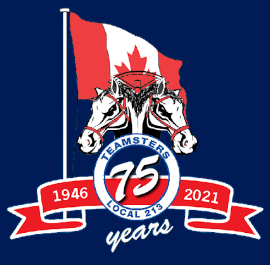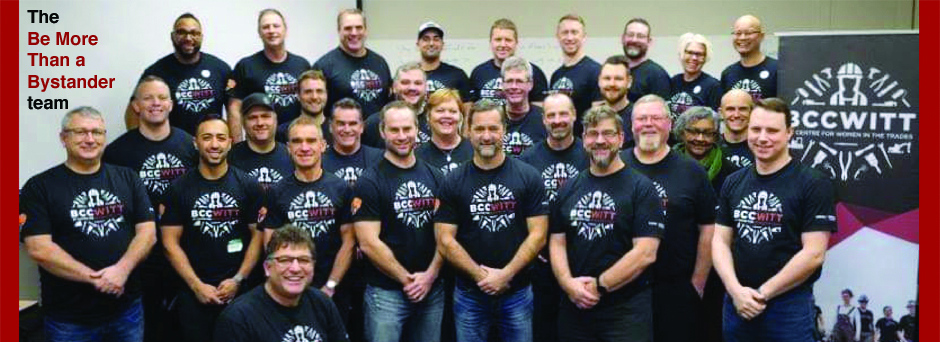By Megan Terepocki
When Rob Duff, training coordinator for Teamsters Local 213, signed up for Be More Than a Bystander training, he hesitated. Would it be one of those fluffy courses that wasn’t worthwhile? It turned out the course was far from fluffy.
“There wasn’t anyone it didn’t register with,” said Duff. “It was delivered by men, to men, in a way that made us understand.” The course was taught by retired B.C. Lions players through the B.C. Centre for Women in Trades and Technology.
Bystander training was developed in 2011 as a partnership between the B.C. Lions and Ending Violence Association of B.C. The program teaches the importance of bystanders speaking up to prevent violence against women and girls. Cornerstones of the program are that most men care deeply about the women and girls in their lives and that they have a role in creating change.
“It really opened my eyes to what women go through,” said Duff. “When men get ready for work, they’re thinking about putting on their work boots and the gas in their vehicles, and they’re good to go. When women get ready for work they’re wondering ‘Am I going to get harassed today?’”
The course hit a personal note as men were able to share their experiences. “It’s not a common thing for us to do in a group setting,” he said.
Teamster’s business agent Mike Symons also participated. “I’ve always been aware of what women face on a superficial level.” he said. But it wasn’t until he took the training that he realized how widespread the problem is. “The actual statistics about violence against women are shocking. You know when they talk about the most vulnerable sector of society, from transgender non-binary individuals, to women with disabilities to Indigenous women, I mean it was 50 per cent, 83 per cent and 57 per cent that were sexually assaulted.”
Symons explained there is a continuum of abuse that ranges from attitudes to physical assault. “In the old days you might hear a sexual joke and not really think anything of it. But by not saying anything, you’re setting the bar of what’s acceptable. Once you stop things like jokes at the bottom of the pyramid, it can’t escalate,” he said. “Now we can all have a respectful, safe, productive environment to work in.”
Participants learned how to intervene safely and not to just stand by when conversations turn bad, when someone is harassed or disparaged. “You don’t have to be a superman, just be a voice in the crowd,” said Duff. “You can simply say ‘That’s not funny’ or ‘That’s not cool.’”
“It’s an opportunity to talk to the person, maybe not in front of everybody, and find out what’s going on with the person,” said Symons. You can also ask a woman if she is OK,” he said.
While there has been a lot of work done to prevent violence and abuse in the workplace, there is still much to be done. “We realize this way isn’t working, not socially, not economically,” said Symons. “Women deserve respect and a safe place to work.”
“We’ve got to keep the ball rolling,” said Duff. “It’s going to take a cultural shift. I think it’s going to happen. It just takes time.”

